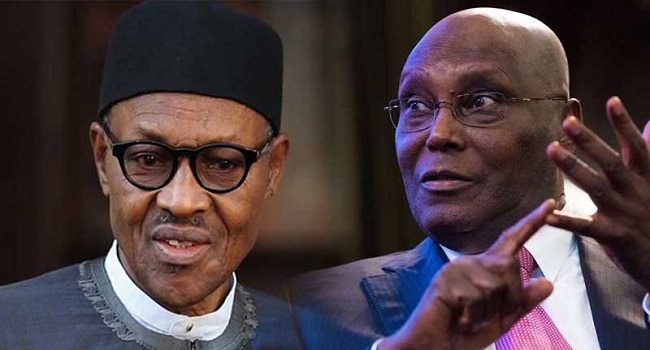News
#PEPTJudgement: Buhari floors Atiku at Tribunal

The Presidential Election Petition Tribunal has affirmed President Muhammadu Buhari as the winner of the 2019 presidential election.
The five-man panel of the tribunal, chaired by Justice Mohammed Garba gave the ruling on Wednesday in the petition bought against Buhari by the Peoples Democratic Party (PDP) and its presidential candidate, Atiku Abubakar.
Other members of the five-man panel of the tribunal that delivered the judgment were Justice Peter Olabisi-Ige, Justice Abdul Aboki, Justice Joseph Ikyegh and Justice Samuel Oseji.
Justice Garba had while affirming Buhari’s election, dismissed Atiku’s claim that Buhari was not qualified to contest the election for not allegedly possessing a West African Examination Certificate (WAEC).
He said that Buhari’s witnesses confirmed that he had a secondary school education.
Noting that Buhari would have been qualified by mere showing that he had a primary school education, Gaba held that the courses attended by Buhari were higher than secondary school education.
According to him, the petitioners failed to prove the allegation of non-qualification or submission of false information which is fundamental in the aid of the 2nd respondent’s qualification.
The tribunal also sacked Atiku’s claim that he won the election based on results allegedly transmitted into the INEC sever.
After the 2019 presidential poll, the National Electoral Commission (INEC) had declared Buhari as the winner. The electoral umpire said he got 15,191,847 votes to defeat the PDP and its presidential candidate, Atiku, who it said, got 11,262,978 votes.
Not satisfied with the result, the opposition party and Atiku dragged Buhari to the tribunal and prayed it to invalidate the result announced by INEC.
They had in their petition accused the electoral body of manipulating the “actual results of the election to amass illegal” votes for Buhari.
They also told the tribunal that INEC supposedly stored the correct results of the 2019 election in a central server.
PDP and Atiku had insisted in their petition that Buhari did not win the highest number of votes cast during the 2019 presidential election.
They had claimed that by an investigation, they found that they won the real results of the election with 18,356,732 votes.
The party and its candidate had also during the trial availed the tribunal with a video clip which showed INEC resident electoral commissioner in Akwa-Ibom State, Mike Igini, explaining that poll results would be collated at the various polling units into the form EC8A after which the collated results would be transferred to the card reader and “transmitted to the central server.”
Ingni had added in the video that “the results declared at the polling units will then be sent directly to the INEC central server.”
PDP’s video was countered by another video Buhari’s lawyer, Alex Izinyon brought to the tribunal.
The video by Buhari’s lawyer showed where Mahmood Yakubu, the chairman of INEC said that owing to poor information network and possible cyber insecurity, election results would not be transmitted through a server.
Yakubu has said in the video, “Recall that we have had discussions with the NCC, telecommunication, we have blind spots, how do we transmit results in blind spots.”
To further prove its case, PDP also called many INEC staff as witnesses and all of them said they sent results to a central server.
While the INEC and the APC refused to call any witness at the tribunal, Buhari only presented seven witnesses.
Timeline of the petition:
March 18, 2019, PDP and Atiku filed the petition challenging Buhari’s victory in the February 23, election.
May 8th, the tribunal’s inaugural sitting chaired by the President of the Appeal Court, Justice Zainab Bulkachuwa. It was followed campaign for Bulkachuwa withdrawal from the matter and her eventual compliance with the demands.
June 10, 2019, the pre-trial started under the chairmanship of Justice Mohamed Garba.
July 3, pre-trial ended.
July 4th to August 1, the main petition heard
August 21, parties in the tribunal adopted their final written addresses.
September 11, judgment was delivered by the tribunal. It used total days of 177 out of the 180 days stipulated by section 285 of the 4th alteration of the 1999 constitution.
Join the conversation
Support Ripples Nigeria, hold up solutions journalism
Balanced, fearless journalism driven by data comes at huge financial costs.
As a media platform, we hold leadership accountable and will not trade the right to press freedom and free speech for a piece of cake.
If you like what we do, and are ready to uphold solutions journalism, kindly donate to the Ripples Nigeria cause.
Your support would help to ensure that citizens and institutions continue to have free access to credible and reliable information for societal development.
























